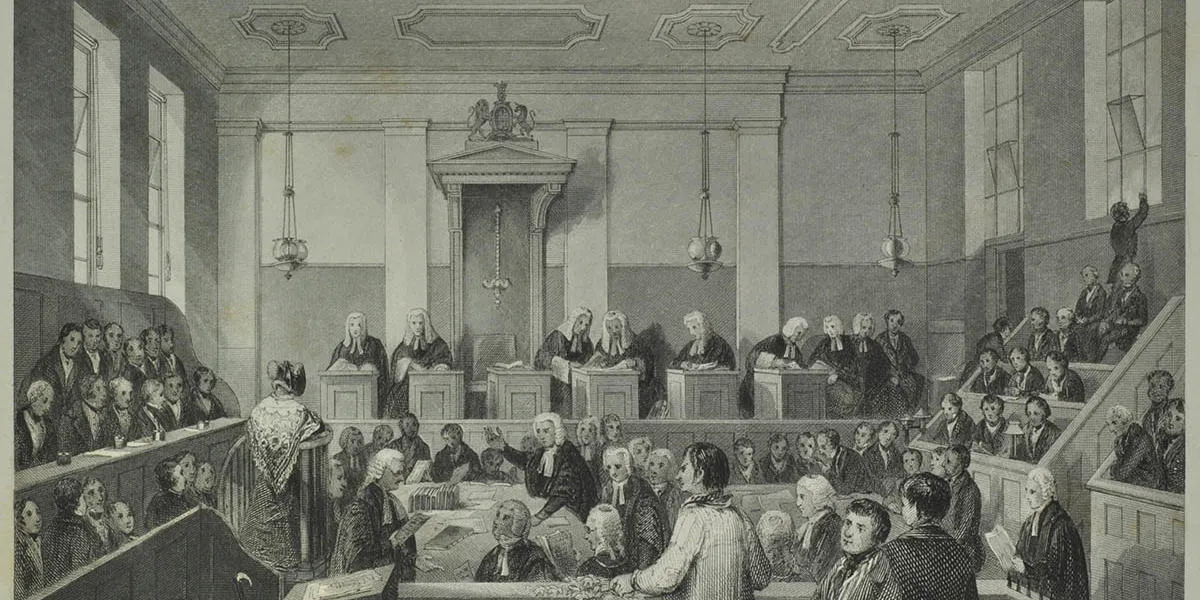Criminal court cases: an overview

1. About this Guide
This is a guide to the different types of criminal court records that are held at The London Archives.
Most court records are not online so you will need to either visit us to consult the records in person or apply for our Paid Document Research Service.
Court records are arranged in a hierarchical structure, with magistrates or petty sessions courts dealing with lower-level crimes and quarter sessions dealing with more serious matters.
2. What should you expect to find within the court record?
Records will be arranged by the court that created and deposited the records with us. There may be different types of documents depending on the court that they were from and also the date that they are from.
Generally, you should expect to find details of the indictment, this is the official charge made against the person being prosecuted. You should also expect to find details of the verdict of the court, although you will not always find out details of where any sentence handed down was actually served. For some courts, you may also find other documents relating to the trial ranging from administrative documents like bail pieces, right through to written witness statements and statements from the accused.
What you will not find however will be transcripts of what was said in court. Contemporary journalist accounts from newspapers will be the best place to get an idea of how the actual court proceedings went.
3. How to search for records
In general, you cannot search our catalogue by typing in the name of the defendant or any of those involved in the case, although occasionally this is still worth doing, especially if the case was heard at the Middlesex Sessions. For most cases however, details of the case will be found within registers or on sessions rolls. You will therefore need to establish in which court the case was heard and then follow the relevant research guide to see what records survive.
Step 1: Find out the date and location of the court case
There are a number of different sources that can help to establish where and when a case was heard.
- Criminal registers and calendars - These give details of convicted criminals and will show the date of the conviction and in which court it took place. These can be found in manuscript and printed format and many of them are also searchable online, particularly in the following two datasets: Criminal Registers 1791-1892 on Ancestry.co.uk (charges apply) and Crime, Prisons & Punishment, 1770-1935 on Findmypast.co.uk (charges apply)
- Newspapers - Local newspapers often reported on criminal cases, and this can help you find out when and where a case was heard. The best place to start for local newspaper accounts is the digitised collection of the British Library which are available on The British Newspaper Archive website
Step 2: Do The London Archives hold the records of this court?
Once you have discovered where the case was heard, you then need to find out who holds the records of that court.
We hold the records for the following courts:
- Petty Sessions/Magistrates' Courts for London
- Middlesex Quarter Sessions
- Westminster Quarter Sessions
- City of London Quarter Sessions
- County of London Quarter Sessions (known as Inner London Sessions from 1965)
While we hold records of many courts within London, records of some courts particularly those that dealt with the most serious cases might be held elsewhere. Here are some useful guidelines:
- Cases heard at the Old Bailey can be found in our records of the City of London Quarter Sessions and Middlesex Quarter Sessions up to 1834. After this date, the Old Bailey becomes the Central Criminal Court and the records are held at The National Archives
- Crown Courts replaced the quarter sessions at the beginning of 1972. Crown Court records are not held here, but some have been deposited at The National Archives
- Records of the high courts such as the Supreme Court, Chancery, Kings Bench and Queen’s Bench are held at The National Archives
- County Court cases which dealt with civil matters rather than criminal matters are not held here. For surviving records, please approach the court itself or if the court no longer exists, the nearest County Court to that area
Step 3: Consult the Research Guides
Once you have established that we hold records for a particular court you should consult the relevant research guide:
- Criminal court cases: Magistrates' Courts (coming soon)
- Criminal court cases: Middlesex Sessions up to 1889 (includes Middlesex cases at the Old Bailey up to 1834 and Westminster Quarter Sessions)
- Criminal court cases: City of London Sessions (includes City of London cases at the Old Bailey up to 1834)
- Criminal court cases: Middlesex Sessions post 1889
- Criminal court cases: County of London Sessions